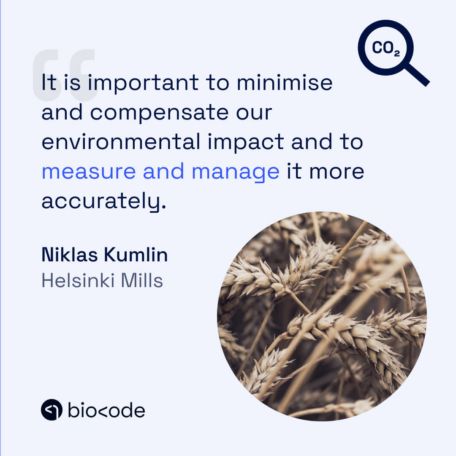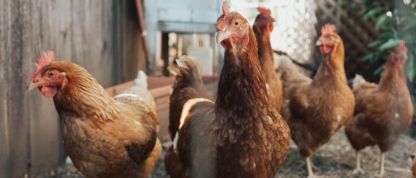

Helsinki Mills calculates the product carbon footprint with Biocode

As a tool in the sustainability toolkit, Helsinki Mills chose Biocode’s carbon footprint calculator, which enables product-specific carbon footprint calculations covering the carbon footprint of food from the field to the store shelf.
Deep expertise is required in both emission calculation and reporting, monitoring regulatory developments, and sustainability work itself. While the entire organization participates in advancing sustainability, deep expertise and resources within the organization are paramount, especially in tasks related to regulation and engaging farmers.
Currently, Helsinki Mills relies on external experts for these complex issues, but in the future, they aim to handle things themselves with digital tools like Biocode’s assistance.
Impact stems from company values
Environmental responsibility has always been crucial for Helsinki Mills. Long-term efforts have been made to reduce carbon footprints, and responsibility is deeply ingrained in Helsinki Mills’s DNA as a fourth-generation family business. Owners have a strong desire to leave the company in a better state for the next generation.
Helsinki Mills aims to be at the forefront. Instead of waiting for mandatory sustainability reporting, impact assessments have been conducted for years. Verified environmental actions are desired to ensure that future generations also have land to cultivate.
Examples of long-term climate work include Helsinki Mills’s own bio-power plant, which was commissioned in Vaasa in 2013, using oat husk waste to produce thermal energy. Thanks to the bio-power plant, approximately 5,000 liters of fuel oil are saved annually in Vaasa, and its use has been completely discontinued. Additionally, since 2010, all of the company’s production facilities have used hydroelectricity.
Furthermore, Helsinki Mills has implemented a responsible farming program aimed at reducing negative environmental impacts of cultivation and improving soil fertility. In the future, emissions from farming are also intended to be calculated and offset.

Sustainable and resilient agriculture at the core
Domesticity and transparency are important issues for Helsinki Mills. Sustainability and sustainable agriculture that benefits both people and nature are at the heart of the company’s vision. Helsinki Mills wants to secure the future of food production and reduce the environmental impact of its own operations. Extreme weather events, such as soil depletion and species depletion, affect agriculture and thus the company’s access to the most important raw material.
Helsinki Mills commits to sustainable development and continuously develop its processes to ensure they produce the best possible food. The company produces exclusively plant-based food since 1934 and does its best to provide easy and healthy options for the modern consumer as well.
Helsinki Mills has published numerous recipes on its website to help consumers switch to climate-friendly domestic oats in their home kitchens, replacing rice or pasta.
Appreciating the environment while doing business
Helsinki Mills has reduced and offset its carbon footprint for two years now. Next, the company will focus on the product carbon footprint and life cycle calculations. It has been clear to the company from the very beginning that the way to succession is to produce safe and high-quality products that value nature. Helsinki Mills does business on the terms of environmental responsibility.
It is important to minimise and compensate our environmental impact and to measure and manage it more accurately. We strive to be a net positive player from the perspective of sustainability.
Niklas Kumlin, CEO of Helsinki Mills
To be successful, companies need to continuously work on developing their products and consider their impact on the climate. Helsinki Mills is a good example of this. They are using Biocode to help them understand and reduce the environmental impact of their products. By doing so, Helsinki Mills is ensuring that their products will remain successful in the future.
🔎 Check out the Helsinki Mills’ calculations.
Try for free.
No strings attached.
Become part of the solution in the combat against climate change. By signing up you can immediately examine and test the carbon footprint calculations of your products.
14-day free trial, no credit card required
EXPERIENCE CARBON FOOTPRINTING AND EMISSION CALCULATION
Full access to try the company emission & product carbon footprint calculator
Training, support and reporting services require a paid plan. Personal use for farmers and producers is free.
Stay tuned and subscribe to our messages about the climate, food industry and food supply chain




